Before COVID-19 caused international tourism to grind to a halt, Keith Barnes was used to spending 20 to 25 weeks away from his home in Taichung every year.
Barnes — the founder of Tropical Birding, a company that specializes in birdwatching, nature and nature photography tours — reckons that, before the pandemic threw a spanner in the works, he flew between 80,000 and 110,000km in each 12-month period.
In March 2020, he was leading a group in Ghana when countries began to close their borders.

Photo courtesy of the New Taipei City Government
“Four fifths of the way through the trip, it became apparent that everyone had to get back to their home countries as soon as possible,” he recalls.
He got back to Taiwan without incident, and did 14 days’ home isolation. Since then, he’s not left the country.
“I think I’d never spent more than three consecutive months on the island before,” says Barnes, who relocated to Taiwan from his native South Africa in 2010.
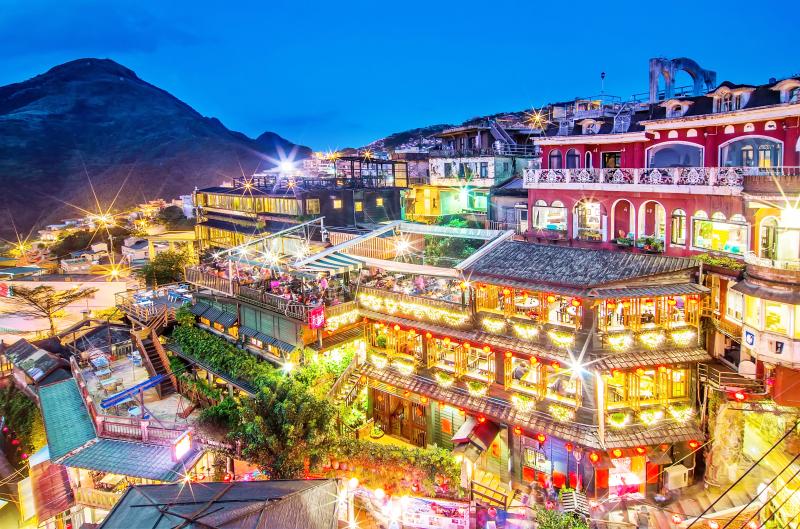
Photo courtesy of the Tourism Bureau
The past 14 months have been stressful for Barnes, and surprisingly busy even without tours to lead. In addition to steering his company through turbulent waters, he’s been responding to inquiries from customers whose trips were canceled, or who expected things would quickly return to normal.
Barnes says the financial crisis of 2007-2008 taught him a lesson about the precariousness of his industry: “Travel is a luxury business. In this game, you need to be aware that everything can suddenly evaporate for very strange reasons.”
On top of the uncertainty, he misses the excitement of international travel.
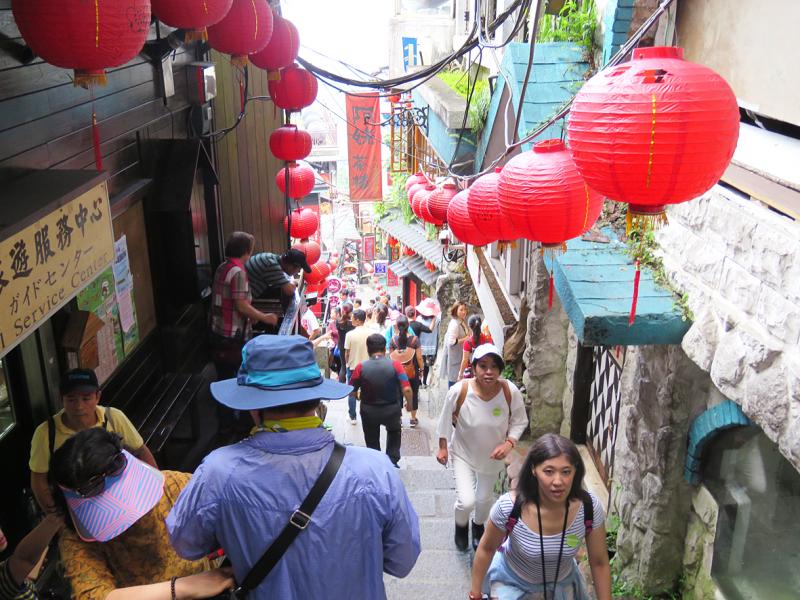
Photo: Lin Hsin-han, Taipei Times
“Even though I despise airports and airplanes, I’ve always found my job to be incredibly enjoyable,” says Barnes.
The recent wave of COVID-19 community transmission and consequent restrictions haven’t made much of a difference to his life, Barnes says, explaining that he’s had several projects on the backburner for years.
“Even before level 3, I was spending most of my time at home, working on them,” he adds.
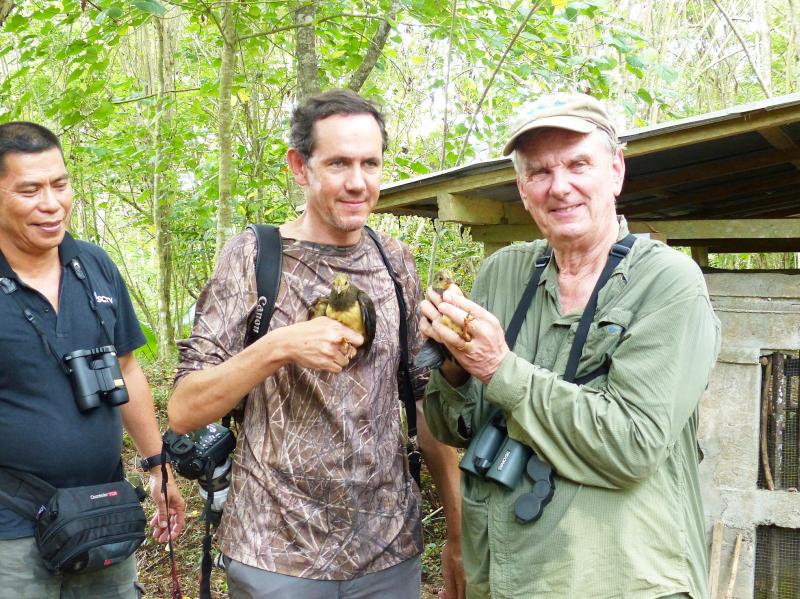
Photo courtesy of Britt Thal
Barnes has been writing two books that draw on the enormous amount of time he’s spent in wildernesses around the world. The first, a field guide to birds in the southern third of Africa, is almost completed. The second is on global biogeography — why animals occur where they do — and aimed at non-specialist readers.
He’s also joined a seabird conservation project that’s trying to reduce the number of albatrosses and petrels accidentally killed by Taiwanese long-liner fishing vessels.
Late last year and earlier this year, he seized opportunities to explore parts of the country he didn’t know well.
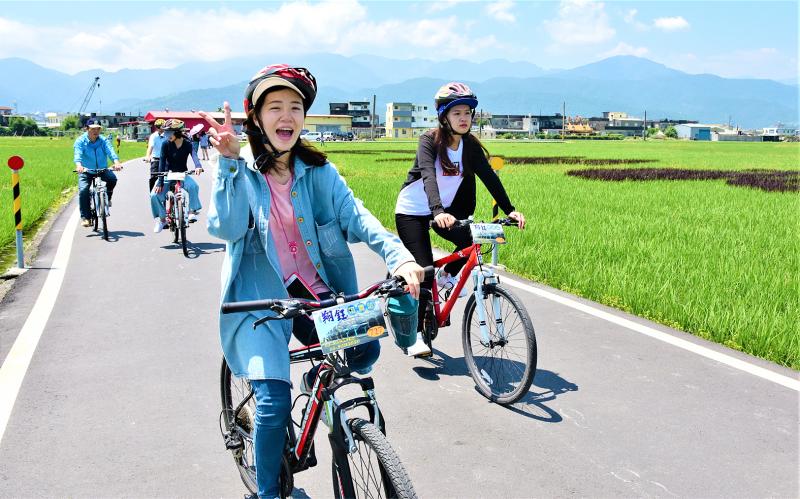
Photo: Chang Yi-chen, Taipei Times
“I’ve also been enjoying the local herpetofauna,” he says.
Before the pandemic, he was away so much, he’d spend every evening he could with his family. Recently, however, he’s used some of his after-dark free time to search for snakes.
“I try to look on the positive side and be grateful for the 14 months of absolute freedom we had, while most of the world was locked down. We’ve been truly fortunate,” he says.
Even now, Barnes is able to get outside and enjoy his passion for birdwatching without breaching social-distancing guidelines.
“Birders are lucky like that. We get to go to places that we love, but which nobody else likes, because of the birds they attract — like sewage farms!”
Barnes expects to resume guiding in August, when he’ll lead a group of American birders around South Africa.
“I’d have already done a tour to Colombia if I’d been fully vaccinated,” he says.
Before the Central Epidemic Command Center raised the nationwide alert to level 3, Barnes received a first dose of AstraZeneca vaccine. In the next few days, he expects to be notified when he can get his second jab.
After South Africa, Barnes will again spend 14 days in home isolation.
“It’s a small price to pay to be able to support the communities and national parks that have suffered from the lack of tourism, and for me to be able to get back to work after a long hiatus,” he says.
PLENTY TO SEE IN TAIWAN
“I’m a third-generation business traveler,” says Everett Lu (陸哲瑋), whose passport shows he left Taiwan at least once every 45 days between September 2017 and March last year.
At the tail-end of the 1895-1945 period of Japanese colonial rule, Lu’s grandfather criss-crossed the Kaohsiung-Pingtung region, dealing in seeds and fertilizer. His father spent extended periods working in China and the US.
When it comes to flying, any sense of novelty that Lu might have felt wore off before he reached his teens.
“While I was in elementary school in Kaohsiung, we often visited my dad in China. And when I was 14, the whole family moved to California, but we came back to see relatives every year,” he says.
Lu is a senior manager in a Kaohsiung-based company that provides services to manufacturers in Southeast Asia. He’s been to every country in that region except East Timor, and most of them five or more times. But that’s not to say he’s become entirely indifferent to foreign cultures.
“I went to Myanmar for the first time in 2019. That’s really a special place. The people there are unlike people anywhere else, in the best possible way,” he says.
Whether Lu will go back once the pandemic recedes is far from certain, however. The military coup in Myanmar on Feb. 1 led to the suspension of several large-scale business projects. These are having a knock-on effect on his clients.
Before level 3 was declared, he made multiple trips to northern Taiwan, some for work, others for pleasure.
“I went to Jiufen (九份) for the first time in my life, and I took my wife and kids to Yilan. There’s a lot more to see in Taiwan than I thought,” he says.
Nonetheless, Lu is sure he’ll be back at Taoyuan International Airport before long.
“Nothing beats a face-to-face meeting when you’re deciding whether to do business with someone,” he says. Like millions of people around the world, he’s had more than enough of Web conferencing technology.
Asked if he thinks that the pandemic has permanently shifted work and travel habits, Lu shakes his head: “Not in my industry. Most of the decision-makers are pretty traditional.”
Steven Crook has been writing about travel, culture and business in Taiwan since 1996. He is the author of Taiwan: The Bradt Travel Guide and co-author of A Culinary History of Taipei: Beyond Pork and Ponlai.
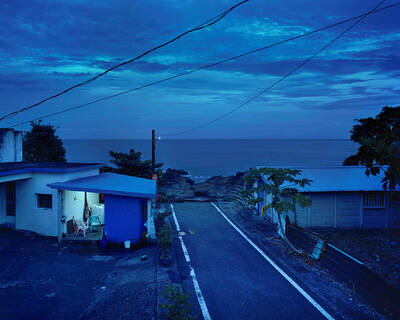
A white horse stark against a black beach. A family pushes a car through floodwaters in Chiayi County. People play on a beach in Pingtung County, as a nuclear power plant looms in the background. These are just some of the powerful images on display as part of Shen Chao-liang’s (沈昭良) Drifting (Overture) exhibition, currently on display at AKI Gallery in Taipei. For the first time in Shen’s decorated career, his photography seeks to speak to broader, multi-layered issues within the fabric of Taiwanese society. The photographs look towards history, national identity, ecological changes and more to create a collection of images

A series of dramatic news items dropped last month that shed light on Chinese Communist Party (CCP) attitudes towards three candidates for last year’s presidential election: Taiwan People’s Party (TPP) founder Ko Wen-je (柯文哲), Terry Gou (郭台銘), founder of Hon Hai Precision Industry Co (鴻海精密), also known as Foxconn Technology Group (富士康科技集團), and New Taipei City Mayor Hou You-yi (侯友宜) of the Chinese Nationalist Party (KMT). It also revealed deep blue support for Ko and Gou from inside the KMT, how they interacted with the CCP and alleged election interference involving NT$100 million (US$3.05 million) or more raised by the
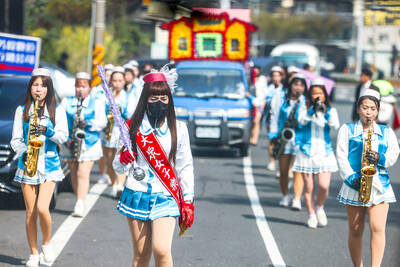
At a funeral in rural Changhua County, musicians wearing pleated mini-skirts and go-go boots march around a coffin to the beat of the 1980s hit I Hate Myself for Loving You. The performance in a rural farming community is a modern mash-up of ancient Chinese funeral rites and folk traditions, with saxophones, rock music and daring outfits. Da Zhong (大眾) women’s group is part of a long tradition of funeral marching bands performing in mostly rural areas of Taiwan for families wanting to give their loved ones an upbeat send-off. The band was composed mainly of men when it started 50
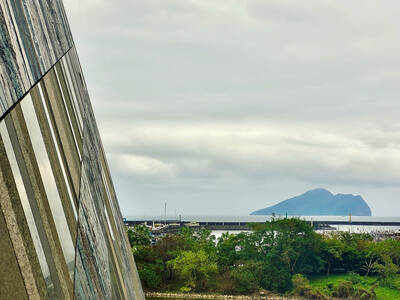
While riding a scooter along the northeast coast in Yilan County a few years ago, I was alarmed to see a building in the distance that appeared to have fallen over, as if toppled by an earthquake. As I got closer, I realized this was intentional. The architects had made this building appear to be jutting out of the Earth, much like a mountain that was forced upward by tectonic activity. This was the Lanyang Museum (蘭陽博物館), which tells the story of Yilan, both its natural environment and cultural heritage. The museum is worth a visit, if only just to get a